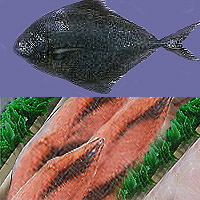health guides
Butterfish

Preparation, Uses, & Tips
The secret to successful butterfish cookery is do not overcook. Whichever of the following cooking methods you choose, your butterfish will be cooked when its flesh becomes opaque but is still moist, and can easily be pierced with a fork. For grilling and frying, leave scales on but cut off the head and tail with a sharp knife. For baking and poaching, rub off the small scales with your fingers.
Baking
Place butterfish in a greased baking dish or wrap in oiled foil and place on a baking sheet. Brush with melted butter or oil and season with salt and pepper, or cover with a piquant sauce. Bake in a preheated 450°F (230°C) oven until done, about 10 minutes for each inch (2.5cm) of thickness.
Grilling
Place the whole small fish directly on greased grill, 4 to 6 inches (10 to 15cm) above prepared coals or fire. Baste with butter, oil, or marinade, and close hood of grill. Cook until fish is opaque and moist on the inside, 6 to 8 minutes.
Pan frying
Coat butterfish with seasoned flour, crumbs, or cornmeal. Shake off extra coating and fry fish in a small amount of hot butter or oil, turning once halfway through cooking time. Cook until opaque and moist on the inside, 4 to 8 minutes.
Poaching
Bring poaching liquid, consisting of water, broth, herbs, and spices, to a simmer. Slip the butterfish in, then cover saucepan and keep liquid at a simmer for about 8 minutes per inch (2.5cm) of thickness.
Copyright © 2024 TraceGains, Inc. All rights reserved.
Learn more about TraceGains, the company.
The information presented in the Food Guide is for informational purposes only and was created by a team of US–registered dietitians and food experts. Consult your doctor, practitioner, and/or pharmacist for any health problem and before using any supplements, making dietary changes, or before making any changes in prescribed medications. Information expires December 2024.


 We are proud to announce that
We are proud to announce that  As the market evolves, customers increasingly request a wider variety of omega-3 options for their lipid...
As the market evolves, customers increasingly request a wider variety of omega-3 options for their lipid...  Maintaining healthy glucose levels is crucial for preventing metabolic conditions like diabetes,...
Maintaining healthy glucose levels is crucial for preventing metabolic conditions like diabetes,...  Looking at formulating a new vitamin blend? Discover
Looking at formulating a new vitamin blend? Discover 







































